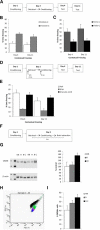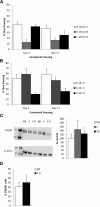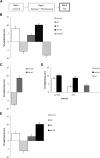Postretrieval Relearning Strengthens Hippocampal Memories via Destabilization and Reconsolidation
- PMID: 30587543
- PMCID: PMC6363934
- DOI: 10.1523/JNEUROSCI.2618-18.2018
Postretrieval Relearning Strengthens Hippocampal Memories via Destabilization and Reconsolidation
Abstract
Memory reconsolidation is hypothesized to be a mechanism by which memories can be updated with new information. Such updating has previously been shown to weaken memory expression or change the nature of the memory. Here we demonstrate that retrieval-induced memory destabilization also allows that memory to be strengthened by additional learning. We show that for rodent contextual fear memories, this retrieval conditioning effect is observed only when conditioning occurs within a specific temporal window opened by retrieval. Moreover, it necessitates hippocampal protein degradation at the proteasome and engages hippocampal Zif268 protein expression, both of which are established mechanisms of memory destabilization-reconsolidation. We also demonstrate a conceptually analogous pattern of results in human visual paired-associate learning. Retrieval-relearning strengthens memory performance, again only when relearning occurs within the temporal window of memory reconsolidation. These findings link retrieval-mediated learning in humans to the reconsolidation literature, and have potential implications both for the understanding of endogenous memory gains and strategies to boost weakly learned memories.SIGNIFICANCE STATEMENT Memory reconsolidation allows existing memories to be updated with new information. Previous research has demonstrated that reconsolidation can be manipulated pharmacologically and behaviorally to impair problematic memories. In this article, we show that reconsolidation can also be exploited to strengthen memory. This is shown both in rats, in a fear memory setting, and in a human declarative memory setting. For both, the behavioral conditions necessary to observe the memory strengthening match those that are required to trigger memory reconsolidation. There are several behavioral approaches that have previously been shown convincingly to strengthen memory. The present demonstration that reconsolidation can underpin long-lasting memory improvements may both provide an underlying mechanism for such approaches and provide new strategies to boost memories.
Keywords: destabilization; fear conditioning; memory; reconsolidation; retrieval.
Copyright © 2019 the authors 0270-6474/19/391109-10$15.00/0.
Figures



Similar articles
-
Increasing the GluN2A/GluN2B Ratio in Neurons of the Mouse Basal and Lateral Amygdala Inhibits the Modification of an Existing Fear Memory Trace.J Neurosci. 2016 Sep 7;36(36):9490-504. doi: 10.1523/JNEUROSCI.1743-16.2016. J Neurosci. 2016. PMID: 27605622 Free PMC article.
-
Taking advantage of fear generalization-associated destabilization to attenuate the underlying memory via reconsolidation intervention.Neuropharmacology. 2020 Dec 15;181:108338. doi: 10.1016/j.neuropharm.2020.108338. Epub 2020 Sep 28. Neuropharmacology. 2020. PMID: 33002500
-
Chronic stress enhanced fear memories are associated with increased amygdala zif268 mRNA expression and are resistant to reconsolidation.Neurobiol Learn Mem. 2015 Apr;120:61-8. doi: 10.1016/j.nlm.2015.02.004. Epub 2015 Feb 27. Neurobiol Learn Mem. 2015. PMID: 25732249 Free PMC article.
-
Windows of change: Revisiting temporal and molecular dynamics of memory reconsolidation and persistence.Neurosci Biobehav Rev. 2025 Jul;174:106198. doi: 10.1016/j.neubiorev.2025.106198. Epub 2025 May 10. Neurosci Biobehav Rev. 2025. PMID: 40354954 Review.
-
Determinants to trigger memory reconsolidation: The role of retrieval and updating information.Neurobiol Learn Mem. 2017 Jul;142(Pt A):4-12. doi: 10.1016/j.nlm.2016.12.005. Epub 2016 Dec 21. Neurobiol Learn Mem. 2017. PMID: 28011191 Review.
Cited by
-
Sleep enhances reconsolidation-based strengthening of visuospatial memories.Sci Rep. 2022 May 4;12(1):7307. doi: 10.1038/s41598-022-11135-6. Sci Rep. 2022. PMID: 35508568 Free PMC article.
-
Apoptotic cell death of stomach cancer lines (AGS) induced by Co-NTB complex through cellular organelles and DNA damage.RSC Adv. 2025 Jan 9;15(2):739-747. doi: 10.1039/d4ra06377e. eCollection 2025 Jan 9. RSC Adv. 2025. PMID: 39802467 Free PMC article.
-
Retrieval-Dependent Mechanisms Affecting Emotional Memory Persistence: Reconsolidation, Extinction, and the Space in Between.Front Behav Neurosci. 2020 Sep 29;14:574358. doi: 10.3389/fnbeh.2020.574358. eCollection 2020. Front Behav Neurosci. 2020. PMID: 33132861 Free PMC article. Review.
-
Cognition-Enhancing Vagus Nerve Stimulation Alters the Epigenetic Landscape.J Neurosci. 2019 May 1;39(18):3454-3469. doi: 10.1523/JNEUROSCI.2407-18.2019. Epub 2019 Feb 25. J Neurosci. 2019. PMID: 30804093 Free PMC article.
-
Modulation of memory reconsolidation by adjacent novel tasks: timing defines the nature of change.Commun Biol. 2023 Dec 19;6(1):1288. doi: 10.1038/s42003-023-05666-5. Commun Biol. 2023. PMID: 38114781 Free PMC article.
References
Publication types
MeSH terms
Substances
Grants and funding
LinkOut - more resources
Full Text Sources
